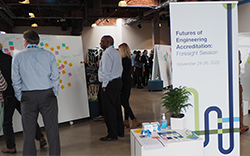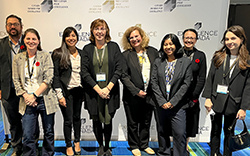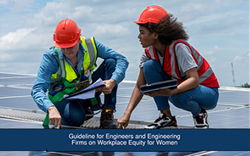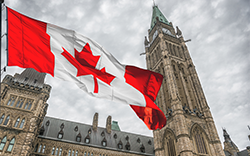President’s message
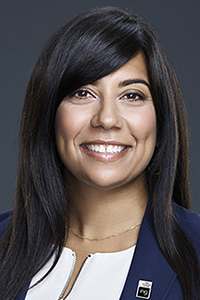
Closing out the first year of our 2022-2024 Strategic Plan, I feel a sense of great accomplishment when I reflect on Engineers Canada’s work. In 2022, we placed a critical strategic focus on the things that matter most: equity, diversity, and inclusion; the future of engineering; engineering accreditation; reinforcing trust and the value of licensure; and national collaboration. I could not be prouder of the pursuits Engineers Canada staff and our community of volunteers have brought to life.
We continue to prioritize building a more diverse, equitable, and inclusive engineering profession, particularly by increasing knowledge. In collaboration with Geoscientists Canada and Engineers and Geoscientists British Columbia, we developed EDI for Engineers and Geoscientists, an online, self-paced foundational knowledge course to develop competencies in inclusive behaviour and cultural and emotional intelligence. In addition, among the research and reports published by Engineers Canada this year were Indigenous Inclusion in Engineering, Report on Truth and Reconciliation in Engineering Education, and, in collaboration with our Indigenous Advisory Committee, an update to our guide on making land acknowledgements. And, through our regulators, Engineers Canada is also offering the 4 Seasons of Reconciliation training to engineers, which seeks to further advance reconciliation, and ensure foundational knowledge of Indigenous peoples, histories, and communities remains accessible.
As the world around us rapidly changes, the expectations of engineers are continually growing. From technological advancements to the inception of new educational practices, engineering is transforming. Cognizant of these emerging changes, we dedicated a strategic priority to examine the current accreditation system with expertise from the engineering community. In addition to the many achievements you will read about under this strategic priority within this report, Engineers Canada held a stakeholder event for this project, with over 70 individuals from the engineering community. Attendees explored emerging shifts and looked holistically at the engineering profession, bringing insightful data and findings to the project research.
With new innovations top of mind, the need for national collaboration and alignment is heightened. In a letter signed by all engineering regulators in Canada, Engineers Canada voiced their alignment on the misuse of “software engineer” and related titles in Canada. The letter, also highlighted by mainstream media, was an opportunity to educate and inform about existing regulations and the risks to public safety.
In 2022, we also laid the groundwork for a national marketing campaign that aims to showcase the diversity of the profession, the breadth of engineering in both traditional and new disciplines, and the value of engineering licensure to the public, engineering graduates, EITs, and employers. This work is done in collaboration with regulators and in partnership with a marketing agency. Preparation for the launch of the first phase of the marketing campaign is underway and will unfold across Canada in 2023.
It has been a remarkable year, one that has better positioned Engineers Canada to continue advancing engineering across the nation. It has been an honour and a great responsibility to have served in a time such as this. I look forward to how the seeds planted today will make an impact in the current and future state of the engineering profession.
Strategic priority 1.1: Investigate and validate the purpose and scope of accreditation
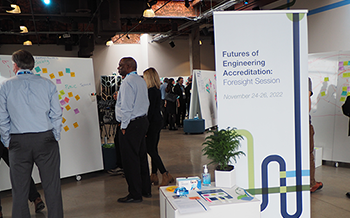
Engineers Canada is undertaking a fundamental review of the accreditation system. In support of this strategic priority, we are investigating best practices in engineering education, working with regulators and stakeholders to understand if there is a desire to adopt a new, national academic requirement for licensure and if appropriate, update the purpose of accreditation. More information on this strategic priority is available on engineeringfutures.ca.
In the first part of the project, volunteer committees were created to guide the development of each phase. In 2021, a benchmarking exercise was completed between our accreditation system and both other international engineering accreditation systems, and the accreditation systems of other regulated professions in Canada. A workshop was held in January with regulators and educators to discuss current and emerging practices in engineering education within Canada, with a research report on the same topic published later that quarter. The benchmarking and emerging practices reports are available at https://engineeringfutures.ca/reports-materials.
A strategic foresight event was held November 24-25, 2022. This event included regulators, the Canadian Engineering Accreditation Board (CEAB) and the Canadian Engineering Qualifications Board (CEQB) members, deans, professors, students, engineers-in-training, engineers, and people who work with engineers. Together, this diverse group looked at the engineering profession holistically, anticipated emerging shifts, and began identifying implications for the accreditation system and the academic requirement for engineering licensure. The group did this by considering what the engineer of the future would need to do and what competencies they would need to have. A complete event journal is available at https://engineeringfutures.ca/reports-materials.
In 2023, Engineers Canada will convene approximately 90 participants to partake in table-top simulations to design, test, and evaluate concepts for an academic requirement for licensure and a purpose of accreditation. We will also conduct in-person consultations with regulators, Engineering Deans Canada, and other stakeholders on the purpose of accreditation and the academic requirement for licensure. By 2024, we expect to present a path forward document to the Engineers Canada Board that recommends next steps for the Canadian engineering accreditation system and associated licensure processes.
Strategic priority 1.2: Strengthen collaboration and harmonization

We have made defining collaboration and the harmonization of requirements, practices, and processes across provincial and territorial jurisdictions a strategic priority. To achieve this objective, we are working with engineering regulators to understand barriers and success factors leading to harmonization, and to understand their needs and constraints as it relates to both collaboration and regulatory harmonization. Should the regulators reach consensus, we will facilitate the adoption of a national agreement that will establish the principles and areas where pan-Canadian harmonization will be sought.
This year, regulators have been consulted on lessons learned from past initiatives. We mapped legislative authorities and shared with the relevant national officials groups to identify potential areas of collaboration and harmonization. We also developed a position paper on regulatory collaboration and harmonization and worked with consultants on a Pan-Canadian consultation plan to ensure that we heard the perspectives of engineering regulators on these topics.
In 2023, we will hold consultations with each regulator to further understand their perspectives, followed by a national workshop with all regulators to provide them with the opportunity to set a shared vision for collaboration and harmonization. If this vision is supported by all regulators, we will develop a statement of collaboration. In the final stages of the project, we will ask all regulators to sign this statement, and will then turn to the CEO Group to select a first area for harmonization.
Strategic priority 1.3: Support regulation of emerging areas

While the regulation of engineering is under provincial and territorial jurisdiction, we support their efforts by providing information to regulators on the long-term impacts of engineering practice in emerging areas and a framework for the evaluation of professional and ethical obligations. Our work enables regulators to educate license holders in specific emerging areas of practice and continue to regulate effectively.
We are developing a research paper on energy engineering and are promoting the role of engineers in emerging areas through existing National Position Statements.
Next year, we will publish our first research paper and begin work on a second one in an area of practice selected by regulators. We will also develop a National Position Statement on the role of engineers in emerging areas of engineering practice.
Strategic priority 2.1: Accelerate 30 by 30

In support of the national goal of reaching 30 per cent of newly licensed engineers self-identifying as female by 2030, Engineers Canada is increasing the national momentum by reiterating its commitment and augmenting its work in this new strategic plan. This year, we held a virtual national conference to foster national discussions on equity, diversity, and inclusion (EDI) in the engineering profession. We also established partnerships with regulators to build EDI capacity nation-wide. We continue to publish our monthly 30 by 30 newsletter, and expanded access from our champions network to the public at large. We completed the regulator-focused Employer Engagement Strategy, and, in collaboration with Geoscientists Canada, updated Managing Transitions: Before, During and After Leave.”
In collaboration with Geoscientists Canada and Engineers and Geoscientists British Columbia, we also developed “EDI for Engineers and Geoscientists”, a self-paced foundational knowledge course to develop competencies in inclusive behaviour and cultural and emotional intelligence.
Next year, we will be holding our 30 by 30 Conference with online sessions and our first in-person Summit on Employer Leadership on May 24, 2023. We will also continue distributing information across the country and maintain our partnerships with regulators and employers. Finally, we will develop an employer strategy.
Strategic priority 2.2: Reinforce trust and the value of licensure

We want to raise the profile of engineering at the national level and familiarize the public, government, and future engineers of the importance of licensure and our regulatory framework. While the public is familiar with, and trusts, the engineering profession, there is an opportunity to promote, through a national marketing campaign, the impact of engineering on the welfare of society, the economy, and the environment.
This year, we formed an advisory group comprised of regulator staff to provide expert advice on the development of a project strategy and deliverables and share knowledge and research to enhance the quality of deliverables and improve the outcomes of this project.
We conducted research to identify gaps and how to fill them. We also unveiled ways to reach out to engineers-in-training (EIT) and engineering graduates to encourage them to become license holders. Finally, we developed key messages on the value of licensure and established the objectives, strategy, audience targeting, and media plan for our future national marketing campaign.
In the spring of 2023, we will launch our marketing campaign across the country. We will also start our outreach strategy toward EITs and engineering graduates.
Strategic priority 3.1: Uphold our commitment to excellence
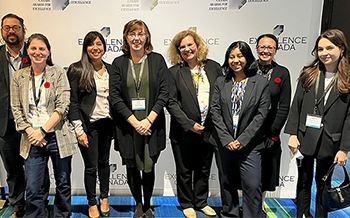
This priority seeks to sustain our collective efforts aimed at self-improvement for the benefit of our staff, volunteers, regulators, and clients. In 2021, Engineers Canada received Excellence Canada’s Gold Certification. Processes and procedures are being developed and implemented to sustain our excellence culture. We have also been identifying and implementing continuous improvements for innovation, clients, and volunteer management.
In 2024, we expect to submit our application to receive the Excellence Canada Platinum Certification.
Core purpose 1: Accreditation

Engineers Canada accredits Canadian undergraduate engineering programs on behalf of regulators. There are 300 accredited engineering programs at 44 higher education institutions across Canada. Graduates who receive a degree in program accredited by the Canadian Engineering Accreditation Board meet the academic requirements needed to become licensed with Canada’s engineering regulators. Since 2010, approximately 750 people have been on an accreditation visit as a Visiting Team Chair, Vice-Chair, Program Visitor, or General Visitor.
In 2022, accreditation decisions continued despite the pandemic. Seven virtual and 17 in-person accreditation visits were conducted, a record for the organization.
Building on previous years’ work, Engineers Canada upheld its commitments to long-term improvements to the system and processes that support accreditation. Work continued implementing Tandem, a new data management system that will improve the operational processes and reduce the documentation burden for Engineers Canada and higher education institutions (HEIs). Implementation of Tandem is expected to be completed in 2023 to support the 2024/2025 visit cycle.
Ongoing improvements to accreditation policies and procedures are continuing and the second Accountability in Accreditation 2022 Report was published.
A consultation was held on possible interventions that can be made in the accreditation system to support the 30 by 30 strategic priority, and this work will wrap up in 2023.
In the final months of the year, a policy to remove accreditation barriers to students going on international exchange was jointly developed with Engineering Deans Canada’s Deans’ Liaison Committee.
Core purpose 2: Regulator relationships

Engineers Canada supports regulators by fostering the sharing of information and collaboration among jurisdictions. In addition, meetings are held between staff working in similar areas to foster consistent practice. Admissions officials, practice officials, discipline and enforcement officials, and the chief executive officers supported the work related to the implementation of the projects on Competency-Based Assessment, the International Institutions and Degrees Database, and the National Membership Database. Engineers Canada also supports information sharing by convening the groups for officials representing finance, IT, and communications to allow them to share challenges and solutions with one another.
In August, Engineers Canada and the engineering regulators released a co-signed statement reiterating the importance of preserving the use of the “engineer” for engineering license holders only. Requiring that only competent individuals call themselves engineers ensures that the public is clear on who can practise engineering and trusts that, should an engineering failure occur, license holders will be held responsible by their engineering regulator.
Core purpose 3: Services and tools
Canadian Engineering Qualifications Board

Through the Canadian Engineering Qualifications Board (CEQB), Engineers Canada develops and maintains papers, guidelines, and syllabi that serve the needs of regulators and practicing engineering license holders. In 2022, the CEQB updated and created the following documents:
- New Public Guideline for Engineers and Engineering Firms on Workplace Equity for Women
- Review of the Materials engineering syllabus
- Review of the Aerospace/Aeronautical engineering syllabus
- Review of the Agricultural/biosystems/bioresource/food engineering syllabus
In 2023, new documents include a new public guideline for engineers and engineering firms on the topic of Indigenous consultation and engagement and a new feasibility study on alternative methods of academic assessment for non-CEAB applicants for licensure. The CEQB will also continue work on a new regulator guideline on duty to report and a guideline on fitness to practice, both of which were started in 2022.
National Membership Database
A New National Membership Database (NBDB used by regulator staff to facilitate mobility of registrants across Canada, was implemented in 2022. The new tool provides enhanced functionality for regulators and Engineers Canada staff along with improved system security and stability.
Competency-Based Assessment tool
In 2022, the translation of all major modules in the Competency-Based Assessment (CBA) tool was completed. While some help videos are still to be translated, the tool is now available in both official languages for all regulators.
Core purpose 4: National programs

Engineers Canada offers a number of insurance products and services for engineering and geoscience license holders, (either active or retired), their practice, family, and businesses.
In 2022, a new 5-year Retention Agreement was launched for the Term Life program.
A rate capping initiative was implemented for the home insurance program, benefitting 40,000 clients. We also decided to maintain our three-year retention initiative, which will have a positive impact on 5,500 policy holders.
The total number of TD Insurance Auto Centres, which provide a one-stop solution for clients to get claims advice, have their car repaired, and rent a car, has increased to 25 across Canada.
We implemented a revised agreement for a one-year term, with automatic one-year renewal term for our pet insurance program.
As COVID-19 restrictions were eased, the return of in-person meetings has led to an increase in usage of the Air Canada Business Travel and Air Canada Meetings and Events programs.
A new broker—Actuarial Analytics—was selected for our National Employee Group Benefit Program (NEGBP).
We launched the fourth iteration of the social media campaign to promote our Secondary Professional Liability Insurance program (SPLIP).
In 2022, building on the success of the 2021 #EngineeringLife campaign, Engineers Canada collaborated with TD Insurance to reach audiences in our newsletter, Engineers Matters, and on the Engineers Canada website. The series garnered over four million impressions on social media, while the related promotion of the TD Insurance home and auto programs received more than three million impressions as a result of the campaign.
In 2023, in collaboration with Manulife, we will launch a marketing strategy to mark the 75th anniversary of the Term Life program. We will also implement a premium credit initiative for those already enrolled in the Engineers Canada sponsored Term Life program. We are also planning a review of the benefits program of our National Employee Group Benefit Program (NEGBP).
Core purpose 5: Advocating to the federal government
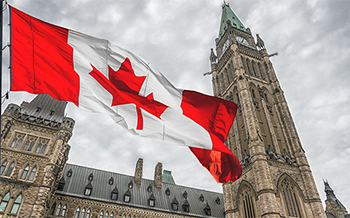
Engineers Canada offers evidence-based perspectives on public policy issues impacting engineering regulators and the profession, advocating for the profession, and influencing government decisions. It actively engages in public affairs and government relations, securing engineering input in policy-making and incorporating engineering expertise into policy development and review.
Engineers Canada seeks to influence national decision-making through the creation and dissemination of National Position Statements, issue statements, government submissions, and engagement opportunities.
National Position Statements
Engineers Canada utilizes National Position Statements to articulate the engineering profession's public policy priorities to the government.
In 2022, Engineers Canada developed and revised the following documents:
- New National Position Statements on:
- Revised National Position Statement on:
In 2023, Engineers Canada will develop new National Position Statements on topics such as Ventilation Systems and Building Management in Reducing Airborne Contaminants, Federal Regulations of Small Fishing Vessel Design, The Role of Engineers in Getting Canada to Net-Zero Emissions, and Professional Practice in Biomedical Engineering. Engineers Canada will also revise its existing positions on The Role of Engineers in Canada’s Long-term Economic Recovery and Climate Change and Extreme Weather Events.
Issue Statements
Issue Statements are designed to promptly respond to government actions or emerging concerns that impact the engineering regulators and profession. In 2022, Engineers Canada issued a new Issue Statement addressing Federal Regulations of Fishing Vessel Design.
Government submissions
In 2022, Engineers Canada actively advocated for the engineering profession by presenting written briefs and engaging with the federal government on important issues. These efforts resulted in several opportunities for Engineers Canada to provide insights and recommendations on topics related to the regulation of the engineering profession. They included:
- Engineers Canada’s comments to Environment and Climate Change Canada regarding the implementation plan for Canada’s National Adaptation Strategy
- Engineers Canada’s submission to the House of Commons Standing Committee on Finance in Advance of the 2023 Budget
- Engineers Canada’s comments to Environment and Climate Change Canada regarding Canada’s National Adaptation Strategy Discussion paper
- Engineers Canada comments to the Treasury Board Secretariat of Canada regarding the Breaking down inter-jurisdictional regulatory barriers initiative
- Engineers Canada’s testimony to the Standing Senate Committee on Transport and Communications
- Engineers Canada's comments to the American Society for Testing Materials International regarding the proposed change to the definition of “engineer” in ASTM F2783.
- Engineers Canada comments to Ministers Blair and Guilbeault regarding the Council of Canadian Academies' "Building a Resilient Canada" report
- Engineers Canada's comments to Fisheries and Oceans Canada and Transport Canada regarding federal regulations of small fishing vessel design
- Engineers Canada’s comments to Environment and Climate Change Canada on the Climate Science 2050 National Climate Change Science Plan
- Engineers Canada comments to the Standing Committee on Finance regarding Pre-Budget Consultations in Advance of the 2022 Budget
- Engineers Canada's comment on the proposed amendments to the CER Onshore Pipeline Regulations
Engineers Canada’s government submissions are available on our website.
Engagement opportunities
Engineers Canada also regularly held meetings with elected officials and government officials to provide expertise and address topics related to the engineering regulators and profession. We have also provided testimony to the Standing Senate Committee on Transport and Communications regarding their study of the impacts of climate change on critical infrastructure in the transportation and communications sectors and the consequential impacts on their interdependencies.
Core purpose 6: Researching, monitoring and advising

Engineers Canada monitors the international and national environment and shares this strategic information with engineering regulators so that they can adapt to upcoming trends and mitigate risks.
Building on a survey conducted in 2021, workshops were held with diverse stakeholders to discuss and analyze the future of the engineering profession. As a result of multiple workshops with this group, an Envisioning Report was drafted and shared with regulators. It collected perspectives on changes that will likely impact the engineering profession in the next decade.
In 2023, new documents include a regulatory research paper on multidisciplinary engineering.
Core purpose 7: International mobility

Engineers Canada conducts international activities on behalf of provincial and territorial regulators. International agreements, databases, and information are used and shared to facilitate the mobility of individuals to Canada and for Canadian engineers abroad. We also disseminate information to regulators on international trends, helping them adapt to an ever-changing context. Finally, we help individuals trained abroad to understand the engineering regulatory context in Canada through the EngineerHere.ca website.
The highlight of this year was that Engineers Canada was once again renewed as a Washington Accord signatory for the maximum six-year term. The Washington Accord includes 23 jurisdictions that recognize the substantial equivalence of each other’s undergraduate engineering accreditation systems. Our continued participation facilitates the licensure of graduates from these jurisdictions and gives us the ability to influence international benchmarks regarding undergraduate engineering accreditation. We also continue to be members of the International Professional Engineering Alliance (IPEA) and the APEC Engineering Alliance (APEC EA), ABET and the World Federation of Engineering Organizations (WFEO).
Core Purpose 8: Promotion and outreach

Engineers Canada promotes the contribution of engineering to the Canadian society and seeks to attract younger generations to join the engineering profession.
In 2022, a new Explore Engineering website was launched to provide information and attract future engineers to the profession. New cases were also added to the Sustainability in Practice Massive Open Online Course (MOOC), a partnership between Engineers Canada and Polytechnique Montréal. Through the National Outreach Working Group, regulators staff continue to collaborate on Pan-Canadian initiatives to raise the visibility of the engineering profession.
Girl Guide Crest Program
The Engineering crest was created to be awarded to Girl Guides and Scouts who complete engineering- or geoscience-related activities while learning about the engineering and geoscience professions through direct interaction with a member of the engineering or geoscience communities. Once the activity is completed, Girl Guides and Scouts can obtain this crest at no cost. In 2022 we awarded 2,174 crests.
Future City Program
Future City Experience is a free activity that can be completed virtually or in-person that introduces students in grades 6 to 8 to the engineering design process by imagining cities 100 years into the future. Working in teams and guided by an educator and a volunteer engineering mentor, students build a physical model or multiple model segments of their city. In 2022, the theme of the experience was: Living on the Moon. In 2023, the theme will be A Waste-Free Future.
National Engineering Month
National Engineering Month is Canada’s largest celebration of engineering. A different theme is highlighted every week and engineers, EITs, and engineering businesses are encouraged to show their pride in being part of the profession.
Engineers Canada Awards
The Engineers Canada Awards recognize and celebrate the achievements of engineers and engineering students who are advancing the engineering profession and improving the lives of Canadians and others around the world. Recipients in 2022 were:
- Digvir S. Jayas, O.C., D.Sc., P.Eng. – Gold Medal Award
- Bob Dony, PhD, FEC, P.Eng. - Meritorious Service Award for Professional Service Award
- Sandra Odendahl, P.Eng. - Meritorious Service Award for Community Service
- Sanjeev Bedi, PhD, P. Eng. - Medal for Distinction in Engineering Education
- Eve Langelier, ing., Ph.D. - Award for the Support of Women in the Engineering
- Stephanie Quon - Gold Medal Student Award
Learn more about our 2022 award recipients.
Engineers Canada Scholarships
Engineers Canada offers three scholarships, one for undergraduate students and two for graduate students. The recipients of the 2022 scholarships were:
Engineers Canada-TD Insurance Scholarships ($7,500)
- Adam Robertson, M.A.Sc., P.Eng.
- Bai Bintou Kaira, P.Eng.
- Michelle Tilford-Shaw, P.Eng
Engineers Canada–Manulife Scholarships ($12,500)
- Cody Kupferschmidt, M.Sc., P.Eng.
- Niema Afroze, P.Eng
- Parham Joulani, M.Sc., P.Eng.
Engineers Canada Leadership Scholarship ($4,000)
- Antoine Poissant
- Abduljawad (A.J) Kourabi
- Amanda Quinn
- Chigozie Enyinnaya-Okidi
- Madison Squires
- Shanleigh McKeown
- Stephanie Quon
- Vincent d'Entremont
Learn more about our 2022 scholarship recipients.
Fellows of Engineers Canada
In 2022, the following engineers received an Engineers Canada fellowship for their noteworthy service to the engineering profession through their work with either Engineers Canada or the provincial and territorial engineering regulators:
Engineers Canada
- Johanne Lamarche, FEC (Hon.)
Association of Professional Engineers and Geoscientists of Alberta (APEGA)
- Samer Adeeb, FEC, P.Eng.
- Peter Chan, FEC, P.Eng.
- Janet Elliott, FEC, P.Eng., PhD
- Travis Fillier, FEC, P.Eng.
- Tom Johnston, FEC, P.Eng.
- Geoffrey Kneller, FEC, P.Eng.
- Brian Pearse, FEC, P.Eng.
- Jessica Vandenburghe, FEC, P.Eng.
- Jason Vanderzwaag, FEC, P.Eng.
Association of Professional Engineers and Geoscientists of Saskatchewan (APEGS)
- Kristen J. Darr, FEC, P.Geo.
- Lei Meng, FEC, P.Eng.
- Kevin L. Ness, FEC, P.Eng.
- Satyanarayan Panigrahi, FEC, P.Eng.
- Bruce A. Peberdy, FEC, P.Eng.
- Ondiverrapan Thirunavukkarasu, FEC, P.Eng.
- Lisa N. White, FEC, P.Eng.
Engineers and Geoscientists British Columbia
- Damineh Akhavan, FEC, P.Eng.
- Megan Archibald, FEC (Hon.)
- James Blake, FEC, P.Eng.
- Lina Bowser, FEC (Hon.)
- Jennifer Cho, FEC (Hon.)
- Gordon Doerksen, FEC, P.Eng.
- Thomas Drackett, FEC, P.Eng.
- Cameron W. Finnigan, FEC, P.Eng.
- Kumar Fonseka, FEC, P.Eng.
- Donald Gamble, FEC (Hon.)
- Frederick Hanley, FEC (Hon.)
- Dr. Diane Cecile Kennedy, FEC, P.Eng.
- Anja Lanz, FEC, P.Eng.
- Deesh Olychick, FEC (Hon.)
- Jason Ong, FEC (Hon.)
- Neil Russell, FEC (Hon.)
- Caroline Westra, FEC (Hon.)
Engineers and Geoscientists New Brunswick
- Stamatia Baker, FEC (Hon)
- Phillip (Phil) Lamey, FEC, P.Eng.
- William (Bill) Lamey, FEC, P.Eng.
- Kirk Murray, FEC, P.Eng.
- Maggie Stothart, FEC, P.Eng.
Engineers Geoscientists Manitoba
- Anand Birur, FEC, P.Eng.
- Tabitha Bohrn, FEC, P.Eng.
- Neil Chandler, FEC, P.Eng. (SM)
- Cameron Dyck, FEC, P.Eng.
- Robert Janz, FEC (Hon.)
- Michael Maendel, FEC, P.Eng.
- Jason Pillipow, FEC, P.Eng.
- Andrea Watts, FEC, P.Eng.
- Scott Whaley, FEC, P.Eng.
Engineers Nova Scotia
- Nadine Avery, FEC (Hon.)
- Beth Belliveau-Sollows, FEC (Hon.)
- Brittany Dart, FEC (Hon.)
- Christine Larocque, FEC (Hon.)
- Virginia MacQuarrie, FEC (Hon.)
- Denise Pothier, P.Eng.
Engineers PEI
- Greg Clayton, FEC, P.Eng.
- Elliott Coles, FEC, P.Eng.
Ordre des ingénieurs du Québec (OIQ)
- Pierre Jean, FEC, ing.
- Najat Kamal, FEC, ing.
- Eve Langelier, FIC, ing., Ph.D.
Professional Engineers and Geoscientists of Newfoundland and Labrador (PEGNL)
- Sudeshna Abbott, FEC, P.Eng.
- Keather C. Appleby, FEC, P.Eng.
- William A. O'Keefe, FEC, P.Eng.
Professional Engineers Ontario (PEO)
- Afshin Azadmanesh Samimi, P.Eng.
- Maria Fernanda Affonso, FEC, P.Eng.
- Naeim Azizi Tavakkoli, P.Eng.
- Steven Bailey, P.Eng.
- Sanjeev Bedi, FEC, PhD, P. Eng
- Ruben Burga, P.Eng.
- Jeremy Carkner, P.Eng.
- Pellegrino Castaldo, P.Eng.
- Michael Stephen Georgas, P.Eng
- Sharon Gillam, FEC (Hon.)
- Md Akhtar Hossain, P.Eng.
- Tao Fai Lee, P.Eng.
- Huirong Min, P.Eng.
- Ted Naugler, P.Eng.
- Juwairia Obaid, P.Eng.
- Sandra Odendahl, FEC, P.Eng.
- Daniel Ospina, P.Eng.
- Efeng Pan, P.Eng.
- John Penaranda, P.Eng.
- Leah Price, FEC (Hon.)
- Julija Rakocevic, P.Eng.
- Shiraz Rehmani, P.Eng.
- Peter Cornelius Rusch, P, Eng.
- Marcel Titus Rusu, P.Eng.
- Farhad Saghezchi, P.Eng.
- Bilal Sherazi, P.Eng.
- Venkatraman Sundar, P.Eng.
- William Teron, P.Eng.
- William Van-Heyst, P.Eng.
- Arash Yazdani, P.Eng.
Core Purpose 9: Equity, diversity and inclusion

Engineers Canada collaborates with provincial and territorial engineering regulators, engineers, employers, higher education institutions, and engineering students to ensure that the engineering profession reflects the demographics of Canadian society and continues to meet the needs of the Canadian economy. We also collected and disseminated data through the National Membership Report and are establishing partnerships on research on women in engineering. We also updated the Managing Transitions Report.
We released a Report on Indigenous Engineering in Canada this year, which uncovered that Indigenous people are underrepresented in engineering occupations relative to Indigenous representation in the total population and in the labour force both at the national and provincial levels. We also published a Report on Indigenous Inclusion in Engineering, which seeks to provide considerations for how best to support increased Indigenous inclusion in the profession, improve supports, and reduce barriers to Indigenous engineers in their experiences in formative years and post-secondary education. We also revised A Guide to Acknowledging First Peoples and Traditional Land in collaboration with the Indigenous Advisory Committee.
Through provincial and territorial regulators, Engineers Canada is also offering the 4 Seasons of Reconciliation training to engineers, which seeks to further advance reconciliation, and ensure foundational knowledge of Indigenous peoples, histories, and communities remain accessible. Engineers Canada is also going through the process of applying for the Canadian Council for Aboriginal Business’s Progressing Aboriginal Relations certification, a process which started this year.
We also participate in the Decolonizing and Indigenizing Engineering Education Network Working Group and represent Canada through the Canadian Indigenous Advisory Council (CIAC) as a voting member at the American Indian Science and Engineering Society (AISES) (CIAC/AISES). We are also implementing the national Indigenous inclusion and reconciliation in engineering plan.
Core purpose 10: Protecting official marks
Working with the provincial and territorial regulators, in 2022, Engineers Canada provided its consent to 50 requests from applicants looking to register a federally incorporated company containing an official mark in their corporate name.
Additionally, we closed eight trademark opposition files, two of which were abandoned and six settled. Engineers Canada had one successful hearing and two expunged from six identified for expungement.
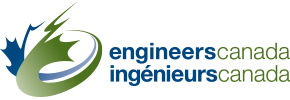
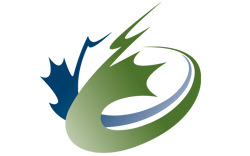
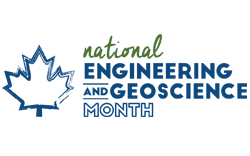
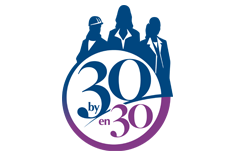
Engineers Canada is the owner of an official mark for each of the following professional engineering designations:
- ENGINEER
- ENGINEERING
- CONSULTING ENGINEER
- PROFESSIONAL ENGINEER
- P.ENG.
- GÉNIE
- INGÉNIERIE
- INGÉNIEUR CONSEIL
- INGÉNIEUR
- ING.
Financial statements
Download the 2022 summary financial statements.

